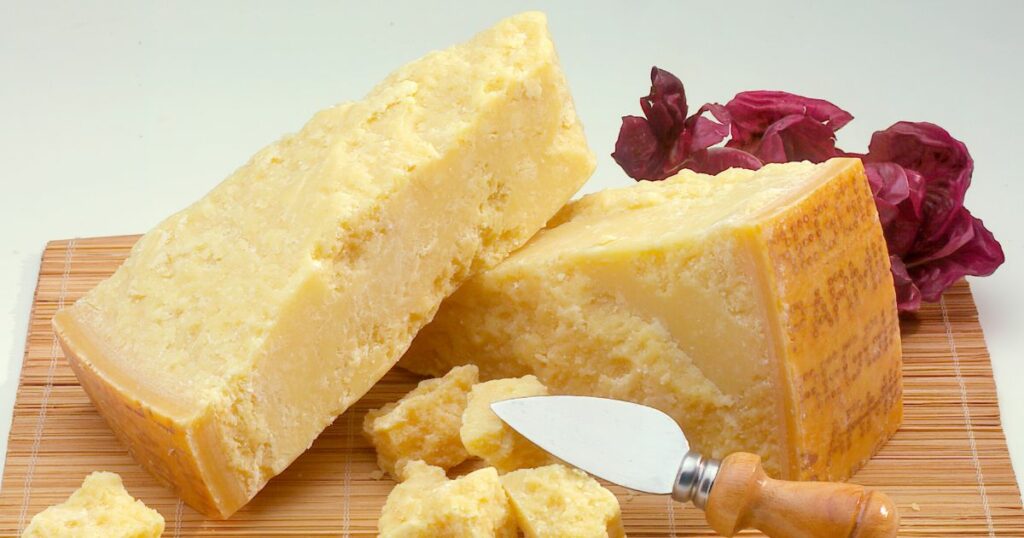History and Origins: The Story Behind the Cheeses
Parmigiano Reggiano cheese is a PDO (Protected Designation of Origin) cheese, made in the Emilia-Romagna region of Italy. The cheese is produced from raw cow’s milk and must undergo an ageing period of at least 12 months. Parmigiano Reggiano is believed to be one of the oldest cheese varieties in the world, with a history dating back to the Middle Ages.
Parmesan cheese, on the other hand, is a generic term used to describe various hard, granular cheese types that are similar to Parmigiano Reggiano. Parmesan cheese can be made anywhere globally and is not subject to the same strict regulations and quality standards as Parmigiano Reggiano. It is often produced using pasteurized cow’s milk and has a shorter ageing period of around 9 to 12 months.
Production Process: How the Cheeses are Made
The production process for Parmigiano Reggiano cheese is traditional, with methods that have been used for centuries. The milk used in its production comes from cows that are fed a natural diet of grass, hay, and other feed. The milk is heated and mixed with rennet to form curds, which are then cut into small pieces and heated again. The curds are then placed into moulds and left to rest for several days before being immersed in a brine solution.
After the brining process, the cheese wheels are placed on wooden shelves and aged for at least 12 months. During the ageing process, the cheese wheels are regularly turned and brushed to promote even distribution of flavour and texture. Parmigiano Reggiano cheese is aged for up to 36 months, and the longer the ageing period, the more complex and intense the flavour becomes.
Parmesan cheese is also produced using a similar process, but it is often made using pasteurized milk, which is heated to high temperatures to kill off any bacteria. This can affect the flavour and texture of the cheese, making it less complex and flavourful than Parmigiano Reggiano. Additionally, Parmesan cheese is aged for a shorter period of time, usually around 9 to 12 months, which also contributes to its milder flavour.
Flavour and Texture: What Makes Them Different
Parmigiano Reggiano cheese has a complex, nutty flavour and granular texture. The cheese has a hard, dry texture and can be crumbled or grated over dishes like pasta, salads, and soups. Parmigiano Reggiano cheese has a strong aroma and a slightly sweet taste, which is balanced by a salty and savoury flavour.
Parmesan cheese, on the other hand, has a milder flavour and a smoother texture. It is less complex than Parmigiano Reggiano and is often used as a topping for pizzas, pastas, and salads. Parmesan cheese has a subtle nutty flavour and a slightly sweet taste, which is balanced by a salty and tangy flavour.
Using Both Cheeses
Both Parmigiano Reggiano and Parmesan cheese can be used in a variety of recipes, but they are best suited for different purposes. Parmigiano Reggiano’s complex flavour and texture make it ideal for dishes where the cheese is the star ingredient, such as in a classic Italian risotto or atop a Caesar salad. Parmesan cheese’s milder flavour and smoother texture make it a great choice for topping pizzas, pastas, and salads, as well as for grating over roasted vegetables or soups. In some recipes, the two cheeses can even be combined to create a unique flavour profile that balances the nutty and tangy notes of Parmigiano Reggiano with the milder flavour of Parmesan cheese. Ultimately, the choice of which cheese to use depends on the desired flavour and texture profile of the dish being prepared.
Nutrition: The Health Benefits and Differences
Both Parmigiano Reggiano and Parmesan cheese are high in calcium, protein, and fat. However, Parmigiano Reggiano cheese is slightly higher in calories and fat than Parmesan cheese due to its longer aging period and higher fat content. Parmesan cheese, on the other hand, is slightly lower in calories and fat, making it a good choice for those who are watching their weight.
Conclusion: Choosing the Right Cheese for Your Recipe
In conclusion, Parmigiano Reggiano and Parmesan cheese are both delicious and versatile cheeses that can be used in a variety of recipes. However, understanding the differences between the two is crucial when selecting the right cheese for your dish. Parmigiano Reggiano cheese is a PDO cheese produced in Italy using traditional methods and has a complex, nutty flavour and granular texture. Parmesan cheese, on the other hand, is a generic term used to describe a range of hard, granular cheeses, is often made using pasteurized milk, and has a milder flavour and smoother texture.
Ultimately, both cheeses are great options for adding flavour and texture to your favourite dishes, but if you want a cheese with a more complex flavour and texture, choose Parmigiano Reggiano. If you prefer a milder cheese with a smoother texture, go for Parmesan. No matter which cheese you choose, make sure to buy high-quality cheese from a trusted source for the best taste and texture.
𐡸 𐡸 𐡸 𐡸 𐫱 𐡷 𐡷 𐡷 𐡷
Frequently asked questions
Parmigiano Reggiano cheese is one of the oldest cheeses in the world, with its origins dating back to the Middle Ages. Its production process has remained largely unchanged for centuries, using only raw cow’s milk, rennet, and salt.
Parmesan cheese is a generic term that can be used to describe any hard, granular cheese similar to Parmigiano Reggiano. However, authentic Parmigiano Reggiano cheese as stated above is a PDO product that can only be made in Italy’s Emilia-Romagna region using specific production methods.
Parmigiano Reggiano cheese must be aged for a minimum of 12 months, but many wheels are aged for up to 36 months or more. The longer the cheese is aged, the more complex and intense its flavor becomes.
Parmesan cheese is typically aged for around 9 to 12 months, resulting in a milder flavor and smoother texture than Parmigiano Reggiano.
Both Parmigiano Reggiano and Parmesan cheese can be paired with a variety of wines, from reds like Chianti and Barolo to whites like Pinot Grigio and Sauvignon Blanc.



